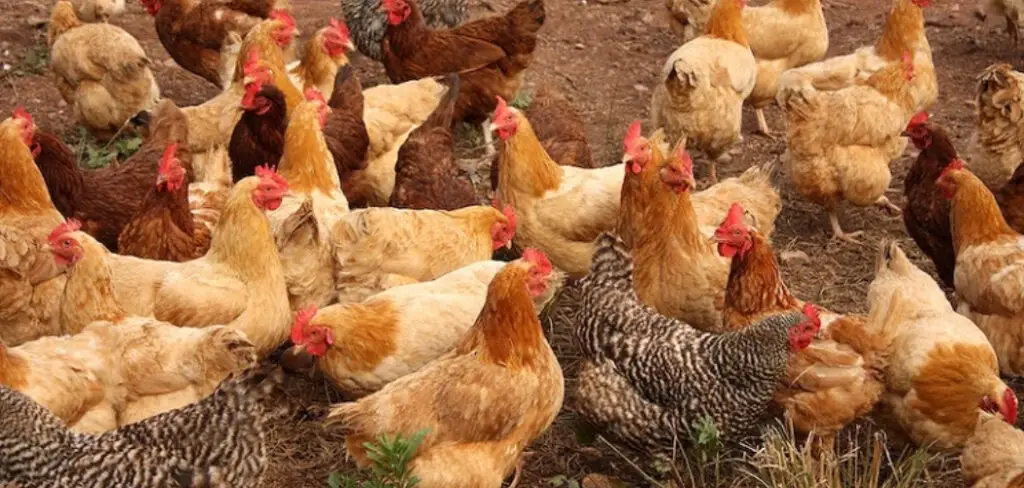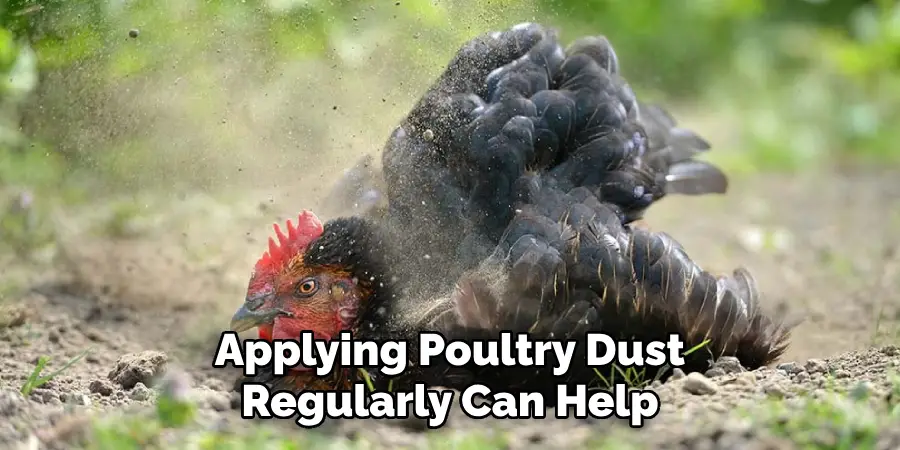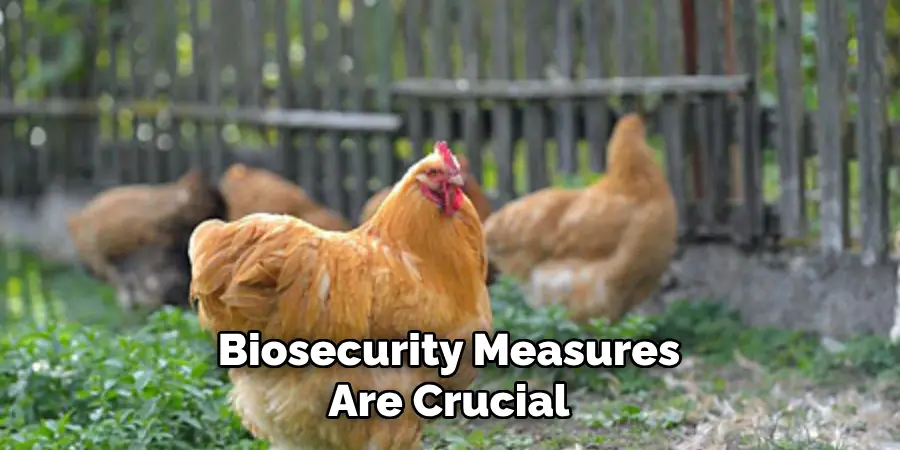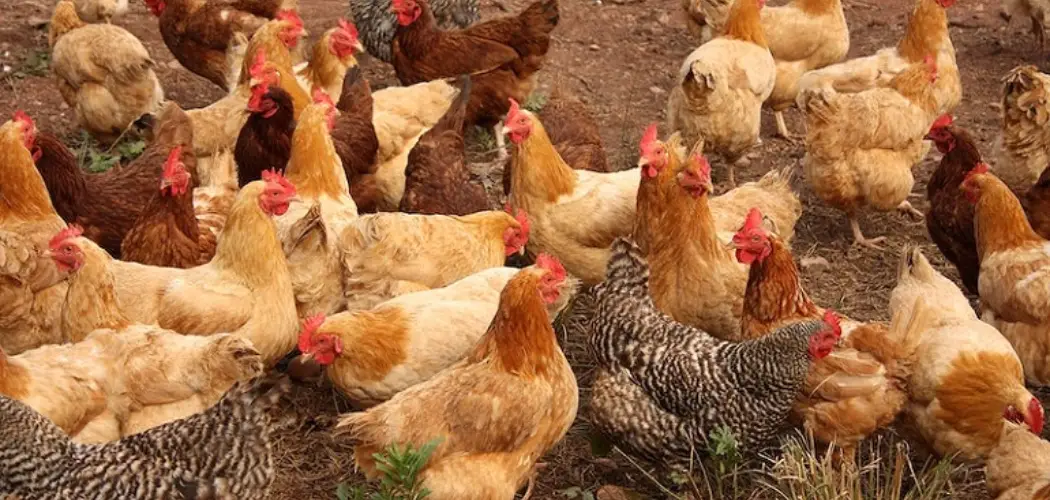Mites are tiny parasites that can cause major problems for chickens. These pesky pests feed on the blood of chickens, leaving them weak and susceptible to other illnesses. They also spread quickly among flocks, making it important to prevent and treat mite infestations as soon as possible. Mites are tiny, eight-legged parasites that can infest chickens and cause a myriad of health issues.

These pesky creatures can lead to feather loss, anemia, decreased egg production, and even death in severe cases. Fortunately, there are several steps you can take to prevent mites from infesting your flock. In this guide, we will discuss how to prevent mites in chickens and keep your birds healthy and happy.
Necessary Items
Before we dive into the prevention techniques, it’s important to have a few items on hand just in case you encounter a mite infestation in your flock. These items include:
- Poultry Dust – This is a powder that contains natural ingredients like diatomaceous earth and can be used to control mites and other pests.
- Dust Mask – It is important to protect yourself when using poultry dust, as it can be harmful if inhaled.
- Gloves – Wearing gloves while handling your chickens and applying treatments can help prevent the spread of mites.
- Coop Cleaner – Keeping your coop clean is crucial for preventing mite infestations, so having a good coop cleaner on hand is essential.
8 Things to Know Before You Start
1) Cleanliness Is Key
Keeping your coop clean is essential for preventing mite infestations. Mites thrive in dirty and damp environments, so regularly cleaning and disinfecting your coop can go a long way in deterring them from infesting your flock.

2) Inspect New Birds
If you are adding new birds to your flock, it’s important to inspect them thoroughly before introducing them to your existing flock. Look for signs of mites, such as feather loss, red skin, and scabs. Quarantining new birds for a few weeks before adding them to the flock can also help prevent the spread of mites.
3) Check for Hiding Spots
Mites are nocturnal creatures that hide during the day, so it’s important to thoroughly inspect your coop for any potential hiding spots. These can include cracks and crevices, roosting bars, and nesting boxes.
4) Keep Your Birds Separated
If you do encounter a mite infestation in your flock, it’s important to separate the infected birds from the rest of the flock. This will help prevent the spread of mites to healthy birds.
5) Use Poultry Dust
Poultry dust is an effective way to control and prevent mite infestations in chickens. It can be applied directly on your birds, as well as in their coop and nesting boxes. Be sure to follow the instructions on the package for safe and proper use.
6) Consider Natural Remedies
If you prefer to use natural remedies, there are several options available for controlling mites in chickens. Diatomaceous earth, essential oils, and herbs like garlic and oregano have all been shown to be effective in deterring and treating mite infestations.

7) Practice Proper Hygiene
Mites can also spread through contact with other animals or contaminated surfaces. It’s important to practice proper hygiene when handling your chickens and their living environment, such as washing your hands and changing into clean clothes before and after interacting with your flock.
8) Monitor Your Flock
Regularly monitoring your flock for signs of mites is crucial in preventing infestations from getting out of hand. Keep an eye out for feather loss, red or irritated skin, and excessive scratching in your birds.
Mites can be a major nuisance for chickens and their owners, but with proper prevention techniques, you can keep your flock mite-free.
Remember to keep your coop clean, inspect new birds before adding them to the flock, and use poultry dust as needed. And if an infestation does occur, take prompt action to prevent it from spreading. By following these tips on how to prevent mites in chickens, you can ensure that your chickens stay healthy and happy without the pesky presence of mites.
12 Methods on How to Prevent Mites in Chickens
Method 1: Keep Your Coop Clean and Dry
As mentioned before, cleanliness is key when it comes to preventing mites in chickens. Make sure to regularly clean your coop and remove any damp or dirty bedding. This will not only discourage mites from living in the coop but also prevent other pests and diseases.
Method 2: Use Poultry Dust Regularly
Applying poultry dust regularly can help keep mites away from your flock. You can apply it directly on the birds, in their coop and nesting boxes, and even sprinkle it around the perimeter of the coop. While using poultry dust, make sure to wear protective gear such as a dust mask and gloves.

Method 3: Keep Your Birds Separated
If you notice one of your birds is showing signs of mites, immediately separate them from the rest of the flock. This will not only prevent the spread of mites but also give you time to properly treat the infected bird.
Method 4: Inspect New Birds Before Adding Them to the Flock
Before introducing new birds into your flock, make sure to thoroughly inspect them for any signs of mites. It’s better to be safe than sorry, and quarantining new birds for a few weeks before adding them can also help prevent the spread of mites.
Method 5: Check for Hiding Spots
Regularly inspect your coop for any potential hiding spots where mites could be living. These can include cracks and crevices, roosting bars, and nesting boxes. Clean and disinfect these areas regularly to discourage mites from infesting them.
Method 6: Use Natural Remedies
If you prefer to use natural remedies, there are several options available for preventing mites in chickens. Diatomaceous earth, essential oils, and herbs like garlic and oregano have all been shown to be effective in deterring and treating mite infestations.
Method 7: Practice Proper Hygiene
As mentioned before, proper hygiene is crucial in preventing the spread of mites. Make sure to wash your hands and change into clean clothes before and after handling your chickens, as well as regularly cleaning and disinfecting any equipment used for their care.
Method 8: Install Perches with Smooth Surfaces
Mites tend to hide in the cracks and crevices of rough-surfaced perches. Using perches with smooth surfaces can make it difficult for mites to hide and infest. Additionally, smooth surfaces are easier to clean and disinfect regularly.

Method 9: Use Petroleum Jelly
Applying petroleum jelly on roosting bars and around the edges of nesting boxes can physically prevent mites from accessing these areas. It creates a barrier that makes it difficult for mites to crawl through and protects your birds from infestation.
Method 10: Keep Your Flock Stress-Free
Stress can weaken a chicken’s immune system, making them more susceptible to mite infestations. Make sure your flock is well-fed and has access to clean water, as well as enough space in the coop. This will help keep their stress levels low and prevent mites from taking over.
Method 11: Use Pesticides with Caution
While pesticides can be effective in controlling mites, they should be used with caution around your chickens. Make sure to read and follow the instructions on the package carefully, and consider using natural alternatives if possible.
Method 12: Monitor Your Flock Regularly
Regularly checking your flock for signs of mites is crucial in preventing infestations from getting out of hand. Keep an eye out for feather loss, red or irritated skin, and excessive scratching in your birds. If you notice any signs, take prompt action to prevent the spread of mites to other flock members.
By following these methods on how to prevent mites in chickens, you can effectively prevent mites from infesting your flock and keep your chickens healthy and happy.
Remember to always prioritize cleanliness and hygiene, as well as regularly monitoring and maintaining your coop and flock. With these steps in place, you can enjoy a mite-free chicken-keeping experience. So don’t let mites get the best of your feathered friends – take preventative measures and keep your flock thriving!
8 Things to Avoid When Raising Chickens
Raising chickens can be a rewarding and enjoyable experience, but it’s important to keep in mind that there are certain things you should avoid when caring for your flock. Here are eight common mistakes to avoid when raising chickens:
1) Overcrowding
Chickens need enough space to move around and spread their wings. Overcrowding can lead to stress, aggression, and the spread of diseases and parasites. Make sure your coop has an appropriate amount of space for the number of chickens you have.

2) Lack of Clean Water
Clean water is essential for a chicken’s health. Make sure to regularly clean and refill your chicken’s waterers to prevent the growth of bacteria and algae. Additionally, chickens can easily drown in deep or dirty water, so make sure their water source is shallow and clean.
3) Poor Nutrition
Just like any other animal, chickens need a balanced diet to stay healthy. Feeding them only scraps or low-quality feed can lead to nutrient deficiencies and health issues. Make sure to provide your flock with a high-quality, nutritionally balanced diet.
4) Not Providing Proper Shelter
Chickens need shelter from harsh weather conditions and predators. Make sure their coop is well-built, secure, and properly ventilated. Also, provide them with a designated area for roosting and nesting.
5) Neglecting Egg Collection
If you have hens that lay eggs, it’s important to collect them regularly. Leaving eggs in the nesting boxes for too long can lead to egg-eating and attract predators. But be careful not to disturb broody hens sitting on eggs.
6) Not Checking for Health Issues
Regularly checking your chickens for signs of illness or injury is crucial in maintaining their health and well-being. Make sure to inspect them for any physical abnormalities, parasites, or unusual behavior.
7) Improper Handling
Chickens may seem docile, but they can become stressed or injured if not handled properly. Avoid picking them up by their wings or legs, and always support their body securely when holding them.
8) Skipping Biosecurity Practices
Biosecurity measures are crucial in preventing the spread of diseases within your flock. Make sure to quarantine new birds, clean and disinfect equipment and shoes before entering the coop, and limit visitors to reduce the risk of introducing diseases.

By avoiding these common mistakes on how to prevent mites in chickens and following good practices, you can ensure the health and well-being of your flock. Remember to always prioritize their care and make adjustments as needed in order to provide a happy and thriving home for your chickens. Happy raising!
So don’t let mites get the best of your feathered friends – take preventative measures and keep your flock thriving! So don’t let mites get the best of your feathered friends – take preventative measures and keep your flock thriving! So don’t let mites get the best of your feathered friends – take preventative measures and keep your flock thriving!
8 Additional Tips for a Successful Chicken-Keeping Experience
Raising chickens can be a fun and rewarding experience, but it’s important to keep in mind that it also requires responsibility and dedication. Here are eight additional tips to help ensure a successful chicken-keeping experience:
1) Research Breeds Before Getting Chickens
Different breeds of chickens have different characteristics, such as egg-laying abilities, temperament, and cold or heat tolerance. Make sure to research and choose a breed that best fits your needs and climate.
2) Provide Enrichment for Your Flock
Chickens are curious animals and need mental stimulation to stay happy and healthy. Consider providing activities such as perches, dust baths, and hanging treats to keep them entertained. While free-ranging is also a great option, make sure to do so safely and supervise them.
3) Keep a Clean Coop
Regularly cleaning and maintaining your coop is crucial in preventing health issues for your flock. Make sure to regularly remove old bedding, droppings, and debris. Also, keep an eye out for signs of pests or mites.
4) Protect Your Flock from Predators
Chickens are vulnerable to a variety of predators, including coyotes, raccoons, and even neighborhood dogs. Make sure to secure your coop with proper fencing and locks, and consider using deterrents such as motion-activated lights or sound devices.

5) Provide Proper Nutrition for Different Stages of Life
Chickens have different nutritional needs depending on their age and stage of life. Make sure to provide them with appropriate feed for chicks, pullets, laying hens, and senior birds. However, avoid overfeeding as this can lead to health issues such as obesity or egg-binding.
6) Consider the Climate
Extreme heat or cold can be harmful to chickens. Make sure to take precautions such as providing shade and ventilation in hot weather, insulating the coop, and adding a heat source in cold weather.
7) Prepare for Emergencies
Just like any other pet, chickens can also get sick or injured. Have a plan in place for emergencies, and make sure to have basic supplies on hand, such as first-aid kits and contact information for a veterinarian who specializes in poultry.
8) Enjoy Your Flock!
Last but not least, remember to enjoy your flock! Chickens are wonderful creatures with unique personalities and can provide endless entertainment and joy. Take the time to observe and interact with them, and you’ll have a happy and fulfilling chicken-keeping experience. So don’t let mites get the best of your feathered friends – take preventative measures and keep your flock thriving! End of Section.
Frequently Asked Questions
How Often Should I Clean My Chicken Coop?
You should clean your chicken coop at least once a week and spot clean daily if necessary. It’s important to maintain a clean environment for the health and well-being of your chickens.
How Do I Introduce New Chickens to My Existing Flock?
Introducing new chickens to an existing flock can be a delicate process. It’s important to quarantine the new birds for at least 30 days and slowly introduce them to the existing flock in a controlled environment. This will help prevent the spread of diseases and minimize stress for both groups of chickens.
What Should I Do If My Chicken Gets Injured?
If your chicken gets injured, isolate them from the rest of the flock and clean and treat the wound immediately. Keep an eye on their behavior and seek veterinary care if necessary. It’s also important to regularly inspect your chickens for any signs of injury or illness. So don’t let mites get the best of your feathered friends – take preventative measures and keep your flock thriving!
Do Chickens Need to be Vaccinated?
It’s not necessary to vaccinate chickens, but it’s recommended for certain diseases, such as Marek’s disease. Consult with a veterinarian who specializes in poultry for advice on which vaccinations may be necessary for your flock.
Conclusion
Raising chickens can be a fun and rewarding experience, but it also requires responsibility and commitment. By avoiding common mistakes such as overcrowding, improper nutrition, and neglecting biosecurity practices, you can ensure the health and well-being of your flock.
Remember to do proper research before getting chickens, provide enrichment for your flock, keep a clean coop, protect them from predators, and provide proper nutrition for their different stages of life. With these additional tips on how to prevent mites in chickens and a little bit of love and care, you’ll have happy chickens and a successful chicken-keeping experience!
About
Outdoor Fixes is a distinguished figure in the world of Diy design, with a decade of expertise creating innovative and sustainable Diy solutions.
His professional focus lies in merging traditional craftsmanship with modern manufacturing techniques,
fostering designs that are both practical and environmentally conscious. As the author of diy,
outdoorfixes delves into the art and science of outdoorfixes-making, inspiring artisans and industry professionals alike.
Education RMIT University
(Melbourne, Australia) Associate Degree in Design (Outdoor Fixes) Focus on sustainable design, industry-driven projects,
and practical craftsmanship. Gained hands-on experience with traditional and digital manufacturing tools, such as CAD and CNC software.
Nottingham Trent University
(United Kingdom) Bachelor’s in outdoorfixes.com and Product Design (Honors) Specialized in product design with a focus on blending creativity with production
techniques. Participated in industry projects, working with companies like John Lewis and Vitsoe to gain real-world insights.
Publications and Impact
In diy, Outdoor Fixes his insights on indoor design processes, materials, and strategies for efficient production.
His writing bridges the gap between artisan knowledge and modern industry needs, making it a must-read for both budding designers and seasoned professionals.

